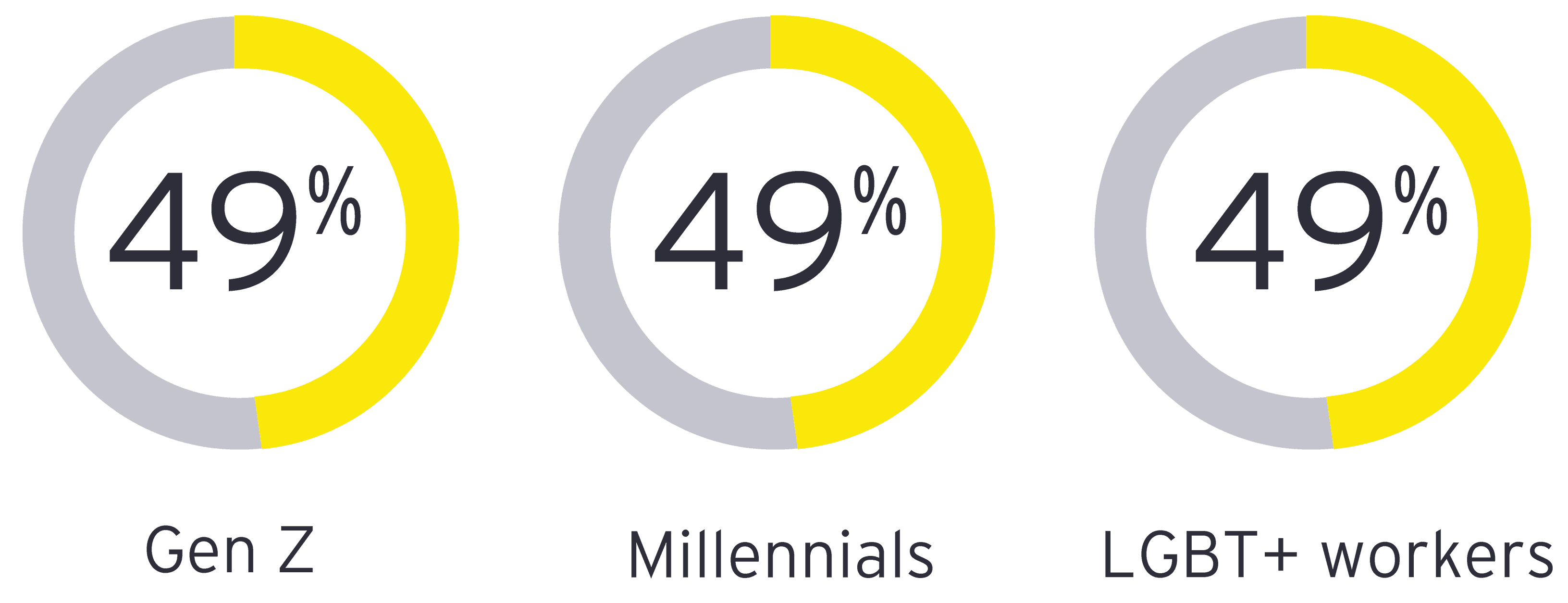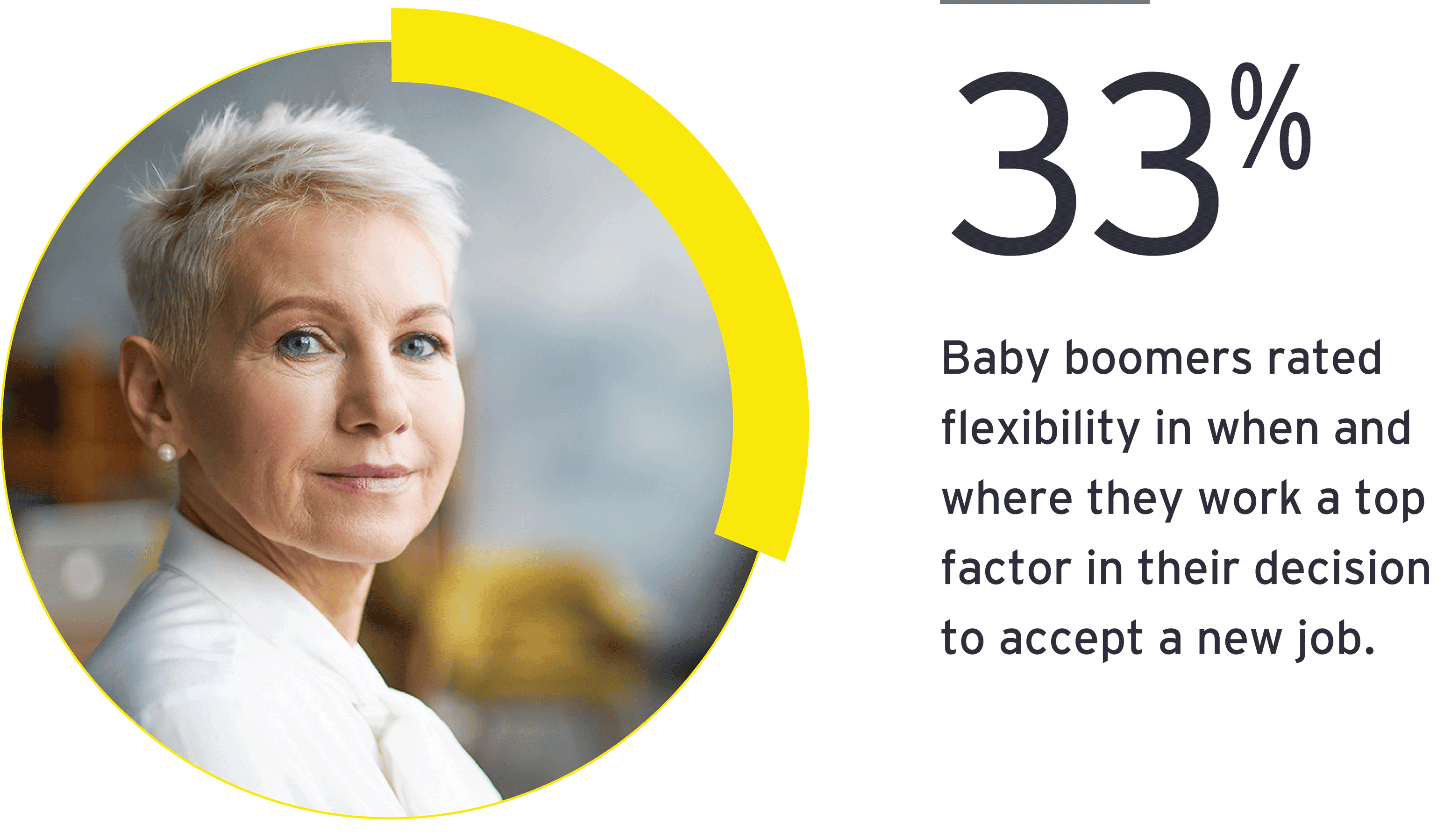EY refers to the global organization, and may refer to one or more, of the member firms of Ernst & Young Global Limited, each of which is a separate legal entity. Ernst & Young Global Limited, a UK company limited by guarantee, does not provide services to clients.

In an effort to better understand workplace preferences across the four main generations in the workforce – Gen Z, millennials, Gen X and baby boomers – and various dimensions of diversity, Ernst & Young LLP (EY US) surveyed 3,000 full-time workers in white-collar jobs at organizations with 5,000 employees or more.
The findings of the 2022 EY US Generation Survey uncovered unique preferences and similarities across company culture; diversity, equity and inclusion (DEI); positions on social issues; and flexibility.

Culture matters more than ever
Regardless of the ways in which people work – in-person, remote or a hybrid format, culture remains a key driver of retention.
- 92% of workers surveyed said company culture has an impact on their intent to stay with their current employer.
- Almost one-third (29%) of baby boomers said culture has little or no impact on their decision to remain with their current employers.
- Those who said company culture had a “great deal of impact” on their intent to stay:
- 39% of millennials
- 39% of LBGT+ workers
- 39% of Gen Z
- 38% of workers with children living in their homes
Download Executive Summary
What DEI means to workers
Companies are continuing to make progress in advancing DEI initiatives. Those efforts aren’t going unnoticed. Three-quarters (75%) of white-collar workers believe their company’s commitment to DEI is authentic.
- A majority of survey respondents (59%) felt that DEI meant “equitable job opportunities.” But they define DEI differently.
- Gen Z respondents said it is a commitment to supporting communities through corporate responsibility efforts and volunteering (44% vs. 35% all generations) and employee resource groups (ERGs) or other internal work communities (34% vs. 27% across the generations).
- Black workers saw it as an investment in the development and advancement of underrepresented populations at work (57% vs. 46% of white respondents).
- LGBT+ respondents said DEI equates to a culture that focuses on belonging (53% vs. 47% of heterosexual respondents).

- 76% of millennials said they’d leave an employer if DEI initiatives were not offered.
- Nearly 3 in 10 (29%) millennials also said they are planning to leave their company within a year because it doesn’t match their values.
Taking a stand on social issues
Social issues continue to dominate headlines in the US, and white collar workers expect their employers to take a public position.
- Over a third (36%) of respondents said their company’s public positions on social issues impact their decisions to stay “a great deal” or “a lot.” Conversely, 57% of baby boomers said that their company's public position on social issues has little to no impact on their intent to stay.
- 49% of Gen Z
- 49% of millennials
- 49% of LGBT+ workers
- 40% of racially and ethnically diverse workers
- 40% of men


Flexibility continues to be a priority
While competitive pay and benefits are unsurprisingly the top two factors in respondents’ decisions to apply for a new position, hybrid work/work-from-home options is the third most important, edging over career advancement opportunities that originally attracted workers to their current companies.
The survey also uncovered the importance of flexibility across generations and various dimensions of diversity:

- 33% of baby boomers rated flexibility in when and where they work a top factor in their decision to accept a new job.
- 35% of millennials cited hybrid/work-from-home options as a top reason for accepting a new job.
- At the same time, 29% of millennials said work-life balance was also a priority when seeking a new position.
- 31% of Gen Z said flexibility in where and when they work was one of the most meaningful things an employer can offer.
- 70% of LGBT+ respondents who think that hybrid/work-from-home options is one of the most meaningful offerings from an employer said they would leave their jobs if these flexible options weren’t provided.
- 35% of millennials who intend to leave their job in the next year said hybrid/work-from-home options would entice them to stay.
- 29% of Gen X felt the same way.




